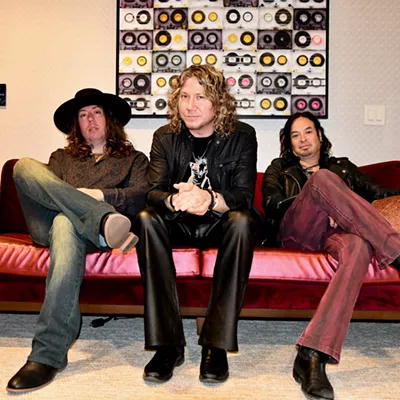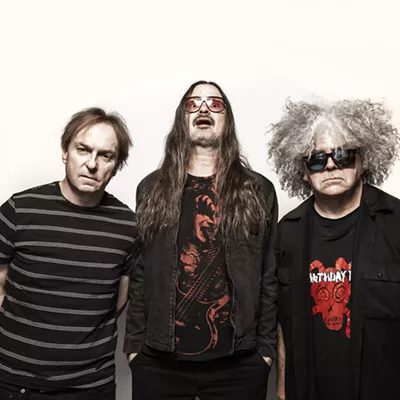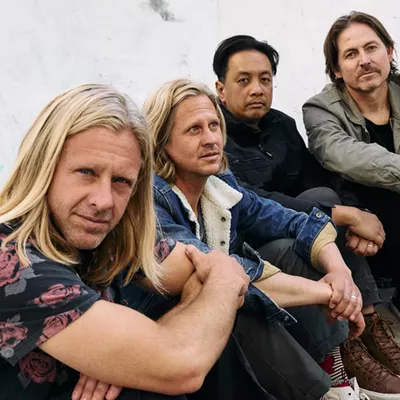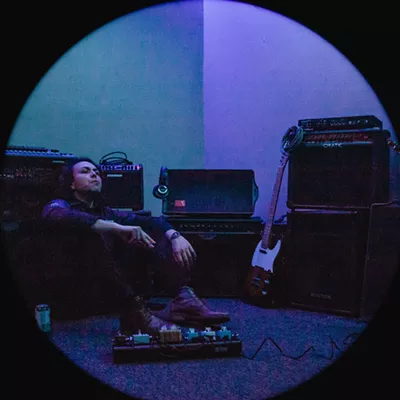The irony is that in 1987, when the then-Sidewinders released their debut album, ¡Cuacha!, there was no such thing as satellite radio. Even CDs were still in their infancy. In fact, the only format on which you could purchase ¡Cuacha! in 1987 was a vinyl LP--and most of those copies skipped. My, how times have changed.
Though the band's core duo of singer/guitarist/songwriter David Slutes and guitarist/songwriter Rich Hopkins are 20 years older now, even a cursory listen to Mas Cuacha, the first new proper Sand Rubies album in nearly a decade, reveals that the music remains largely unchanged. Even so, it's been a long, bumpy road to get to this point.
The Sidewinders came to life in 1985. Hopkins had formed a band, and Slutes invited them to come to his house to use his four-track to record some songs. They had only laid down the basic tracks without vocals when the group's singer quit the band.
Hopkins remembers, "I went over to Dave's house one day to commiserate, and I said, 'Dave, can I listen to those rough tracks?' He was acting a little weird and he said, 'Well, I hope you don't mind, but I wrote lyrics and sang to it'--the song we recorded. I was like, 'What?!" Thinking, how dare you?! Then when I heard it I was like, 'Holy shit! You're in!' He did that because he just felt like doing it, and I was stunned and elated at the same moment. And he was in the band, the singer of the band. That's how we started. It was a real ballsy move."
Influenced more by fellow locals such as Naked Prey, Green on Red and Giant Sand than anyone else (though there's more than a hint of Neil Young, too), the group began gigging, gained a fervent fan base and began recording an album.
"We were always trying to figure out how to get a record deal," says Hopkins. "We just didn't know how to do it. ... So we thought, 'Well, I guess the only way we're going to get a record out is if we just do it ourselves.'" Hopkins formed San Jacinto Records, which released ¡Cuacha! in December 1987.
"Our first record release was at Congress 20 years ago, almost to the day," says Slutes. "It was really like yesterday. And the records all skipped, and the T-shirt images all washed out right away. It foreshadowed our checkered career."
In the summer of 1988, the Sidewinders hit the road for their first U.S. tour. Along the way, they met representatives for the North Carolina-based indie label Mammoth Records, who took an interest in the band. The group had already begun working on a follow-up album, and once it was done, in September, they sent it to Mammoth, which decided to release it. Those were the days when major labels began swallowing up the indies, and before the ink on their contract with Mammoth had time to dry, the Sidewinders found themselves on RCA.
The label would release the band's next two albums, 1989's Witchdoctor and 1990's Auntie Ramos' Pool Hall, and those years would constitute the Sidewinders' salad days: national tours playing shows with The Replacements and Pearl Jam, an article in Rolling Stone, a video in rotation on MTV. Amazingly, the band didn't even have a manager then, with Hopkins mostly handling those duties.
Once a manger was hired, though, things began getting weird in a hurry.
First, there was the band's ever-evolving rhythm section. Slutes says that by 1990, the group had included 19 band members. (Drummer Winston Watson and bassist Ken Andree are the other current occupants.) Then there was the name change. A North Carolina band called Sidewinder sent an order to cease and desist, and the Sidewinders became the Sand Rubies. The group's manager convinced them to leave RCA, first for Ensign/Chrysalis, then later Atlas/PolyGram. There were lawsuits with publishers, massive clashes of egos between Slutes and Hopkins, and on and on.
"I can remember that all the way from '89 to '93, we'd have all these wonderful things happening," says Slutes, "but at the same time, all these bad, crazy things were happening to us as well. I vividly remember telling Rich on more than one occasion, 'But these are the kinds of problems we always dreamed we'd have.' And we'd smile. But by the 80th time ... . Pretty soon, we were just not enjoying it at all anymore, and Rich and I were at each other's throats and needed to get away from one another. We'd carried the thing for eight years by that point."
By the time the Sand Rubies broke up in 1993, things were so acrimonious between Hopkins and Slutes that the pair didn't speak for two years.
But, as the hoary cliché says, time heals all wounds, and the Sand Rubies are a prime example.
"We realized that it wasn't really us," Slutes says. "We always liked each other; we always loved writing and performing music together. And after all the pain and suffering is done, you get past that. Our first reunion show was in '95, and it was just a glorious comeback show we did in Phoenix, really warm and fuzzy for everyone. The crowd was huge and wonderful. So we've had reunions just about every year ever since," he laughs.
Says Hopkins, "The good thing about Dave and I is that we patched this up. We talked about it years later and really made our amends. It took a while to have each other's trust again. And once we did, and kept playing again and made another record--right now, our relationship is probably the best it's ever been."
This week, the Sand Rubies celebrate the release of Mas Cuacha. "With this one," says Slutes, "Rich and I felt like we wanted to do it how we always did it: No one involved; we produce it; we write it; and it really felt like the old times. And it just so happened to be 20 years since our first record, so, to me, it was like a bookend."
The album is in tune with those early Sidewinders albums. Along with the aforementioned "Satellite Radio," highlights include opener "Can't Change That," the snarling garage rock of "Machines" and the slow-burning "Fuk Em." There's a gorgeous duet between Slutes and Phoenix singer-songwriter Lonna Kelley. And, for the first time in the band's history, Hopkins takes lead vocals on the infectious "Ferment."
"Dave finally let me sing a song," says Hopkins. "That was very nice of him; tell him I really appreciate it."






